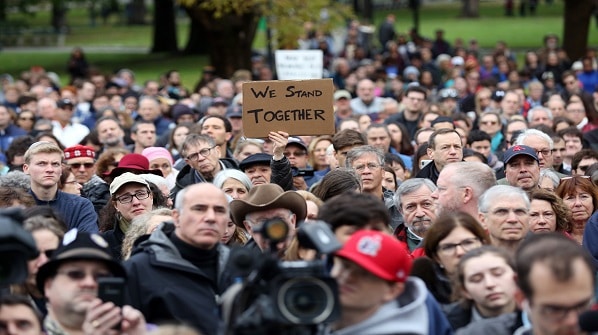This week we marked the shloshim for those murdered at the Tree of Life synagogue in Pittsburgh by white supremacist gunman Robert Bowers; the 30 days following burial in which mourners refrain from some everyday practices and communities engage in performance of mitzvot to honor the dead.
This past Friday night the Jewish community experienced another attack on a congregation, this time in the Hancock Park neighborhood of Los Angeles. Mohamed Abdi attempted to run down two visibly Orthodox men leaving Friday night services while yelling anti-Semitic epithets. Thankfully no one was injured.
These and many other incidents of rising acts of anti-Semitic and other hate crimes have our communities wrestling with new challenges. Wherever I traveled this past month, leaders in institutions – synagogues, JCCs, and others – are grappling with the unenviable task of navigating the balance among competing core values and priorities of Jewish communal spaces: between being safe and being inclusive and welcoming. How much security is necessary? What are the best practices? What measures are “too much,” either because cost outweighs the benefit, or because they exacerbate the problematic experiences for Jews of Color, or otherwise limit the ways in which we aspire to welcome people into Abraham’s four-fold open space?
This is, to say the least, an evolving conversation. And it is one we’ve been having with our own leaders and member agencies here at JCRC. I don’t presume to have “the” answer for every congregation or community, beyond encouraging each of them to have these conversations, to explore their own values, and to ask how they will hold multiple values in a dynamic tension that feels appropriate for them.
Our responsibility at JCRC is to do everything we can to ensure that our governments, at all levels, are doing everything in their capacity to ensure the security of our community and its institutions.
Last year we worked with the New England ADL and the Mass. Association of Jewish Federations (MAJF, which is run by JCRC) to seek Governor Baker’s commitment to reconstitute the state’s Hate Crime Task Force, which he readily did. We’ve been appreciative of the Governor’s support after Pittsburgh and have been pleased in recent days to see him leading on working with the Task Force to encourage all law enforcement agencies to fully report hate crimes and to take other measures to ensure that there is a “zero tolerance” for hate in Massachusetts. Our joint commitment to the vitality of this task force remains strong.
MAJF and JCRC also worked last year with our partners in the state legislature to establish a $75,000 pilot for non-profit security grant funding, complementing the federal grants which we advocate for in partnership with the Jewish Federations of North America. This year, the state doubled the funding to $150,000 and we will be working with the governor and the legislature to increase the pool and streamline the application process to expand eligibility.
And the Jewish Emergency Management System (JEMS), a partnership of CJP, JCRC, ADL, and the Synagogue Council, is helping our network of agencies access a series of trainings and briefings on the issues they are grappling with in this time.
We’re also continuing to work on the range of public policy matters that were important to our community before Pittsburgh, which have taken on increased urgency in its aftermath. We are more committed than ever to ensuring that the United States remains a welcoming place for immigrants and refugees from around the world, including supporting our noble legacy institutions like HIAS, supporting our network of synagogues here in Massachusetts working in concert with interfaith partners to pass gun-violence prevention laws, and challenging those at the very highest levels of public life who are validating and amplifying the kinds of bigotry and hatred that lead to these attacks.
A month after Pittsburgh, the Jewish community has been changed. We don’t know yet fully how. But we do know that we all have a role to play in facing that change responsibly, while also remaining constant in our purpose and our values about who we are in the world.
We have a choice: To react passively to unfolding events, or act with agency, to protect both our community and its most deeply held values. I, for one, choose the latter option.
Shabbat Shalom,
Jeremy




